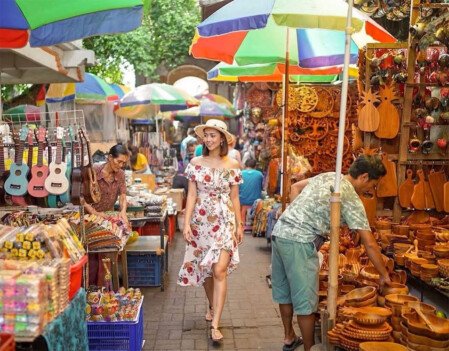Bali is a treasure trove of arts, crafts, and colorful markets. But it’s easy to get swept into tourist prices if you don’t know the ropes. To truly score great deals and enjoy the vibrant shopping culture, you need to bargain with confidence and insider savvy. These nine tips will help you shop Bali like a local—finding authentic treasures, supporting small vendors, and walking away with beautiful memories (and souvenirs!) without overpaying.
1. 🤝 Build Rapport with Friendly Greetings
Spending a little time making a genuine connection with the sellers sets the tone for fairer prices—and maybe even sweeter deals later. Smile, say “Selamat pagi” (good morning) or “Selamat siang” (good afternoon), and ask about their day. Learn to earn “berapa harganya?” (“how much?”) and “boleh kurang?” (“can you reduce?”). This warm rapport tells vendors that you respect local culture and are more than just another tourist.
Why it works:
- Sellers feel seen and appreciated.
- Tension melts, so negotiation becomes enjoyable instead of confrontational.
- Once friendly, they’re more likely to help with suggestions or offer bargains.
2. 🛤️ Explore Off-the-Beaten-Path Markets
While Ubud Art Market and Seminyak boutiques draw crowds, hidden markets like Sukawati, Badung, or Kumbasari provide authentic finds at better prices. Vendors here rely on local and domestic shoppers too, so tourist markups are much lower.
Tips for hidden markets:
- Plan a longer trip—rent a scooter or ask a local to show you around.
- Go early (08:00–10:00) to enjoy crisp morning air and fresher choices.
- Wear comfortable shoes and bring a reusable bag—it’s a mini-adventure!
3. 🗣️ Get Friendly Price Estimates First
Before diving into full negotiation, ask a few vendors your initial question: “Berapa?” (“How much?”). Compare prices across stalls. You’ll quickly grasp the fair range. Armed with this info, you can strategically aim lower or walk away from overheated offers.
Negotiation posture tip:
If one stall charges 200,000 IDR for a sarong and another 150,000 IDR for the exact same design, you’ve spotted leverage. Try opening at 120,000 IDR or simply walk away—with a friendly thank-you!
4. 💵 Learn Local Pricing Patterns & Price Increments
Bali’s markets often price things per piece, so sellers tend to use rounded figures. But once bargaining starts, they may play with 5,000 or 10,000 IDR increments. Here’s how to stay ahead:
- Open low, but reasonably: If typical range is 100K–150K, start at 80K.
- Incremental haggling: Move in 10K or 20K steps up from your offer.
- Leave space to retreat: Offer 80K, let them counter to 90K or 100K, then say “Deal,” or drop a bit lower before shaking hands.
If you feel pressured to pay 1,000 IDR more than your target—that’s still fair. Every market trip is fun culture practice, not a transaction war.
5. 🎨 Embrace Barter with Humor and Kindness
Bargaining isn’t just about money—it’s a dance of smiles and wit. You want to have fun, not ruffle feathers. Here are light-hearted techniques:
- Pause after quotes: Keep your hand close to your wallet and look thoughtful. The pause invites reconsideration.
- Smile and laugh: “Wow, that’s steep!” with a grin signals playfulness, not aggression.
- Cultural jokes: “I am poor student” or “I buy everything with Bintang payout.” It shows you’re playful, not cheap.
Vendors appreciate humor and may match your playfulness with good prices.
6. 🔄 Show Interest And Walk Away Strategically
Walking away is powerful. It signals your limits—and vendors have limited time. If someone really wants to close the deal, they might run after you with a better offer. Here’s how:
- Say a polite thank-you.
- Start walking.
- Wait a few steps.
- Turn back and say, “Okay, if 90K, I buy now?”
- If offered, smile and finalize.
You’ve just turned the negotiation tables—in easy, respectful style.
7. 🛍️ Buy in Bulk for Better Deals
Many markets favor bulk buyers. Planning to buy gifts? Buy 3–5 items from a single stall. Ask:
- “If I take three, what’s the best price?”
- “If I buy five, then?”
- “Free small gift?” (vendors often toss in a bead bracelet or stretch token for nice buyers)
Some sellers have storefronts nearby—treat bulk visits like VIP customers, and you’ll be welcomed and appreciated.
8. 🔍 Inspect Quality Carefully—Check Threads & Patterns
Even the best price is wasted on a subpar item. Watch out for:
- Fraying edges or loose threads—especially in textiles.
- Paint smudges or off-print designs—common in fast-screen prints.
- Uneven dye patterns or suspicious marks—some items are just badly made.
Always ask: May I look closer? Learn to handle items respectfully. If the seller cares about quality, they’ll appreciate your prudence—and maybe sweeten your price further.
9. 🌏 Use Local Currency—and Stay Calm
Small vendors often prefer cash (in Indonesian Rupiah). Tips:
- Bring a mix of denominations (20K, 50K, 100K notes).
- Don’t flash big bills before negotiating. It may invite inflated offers.
- Avoid dynamic currency exchange booths that might offer skewed rates.
If you must use a card, ask politely if there’s a fee. Some sellers might add a 3–5% surcharge.
🧳 Bonus Savvy Shopping Tips
📌 Know the Prime Seasons
- July–August and December–January see tourist crowds and higher prices.
- Shoulder seasons in April–May and September–October can bring lower starting prices and calmer crowds.
🧻 Pack Extras
- Bring a light towel or cloth in case modesty is needed at temple-adjacent shops.
- Have water and sunscreen on hand—you’ll be under the sun bargaining for hours!
🎁 Think Ethical & Support Local Artisans
- Choose fair-trade cooperatives or stalls with locally made goods.
- Ask about the story behind items—many artists love telling you.
- Skip mass-produced souvenirs. Forget the “one-dollar fridge magnet.” You can get more beautiful pieces meant to last.
🎨 Consider Custom Orders
Some vendors offer tailoring or customization—like cropped sarongs, personalized wooden carvings, or silver stamped with your name. It’s cheaper than big tourist shops and deeply personal.
💡 Embrace Payment with Apps
Increasingly, small vendors support QRIS (QR code payment). It’s secure, convenient, and avoids carrying bulky cash. Always ask gently!
🧭 Sample Bargaining Scenarios
1. Sarong from a beach-stall
- Opening price: 120K
- You offer: 80K
- Vendor counters: 100K
- You pause, say “Hmm…”
- Vendor lowers to: 90K, you say “Deal!”
- Outcome: 25% off—done!
2. Hand-carved wooden mask
- Opening price: 350K
- Don’t like? Walk.
- Vendor chases and says: 300K
- You counter: 250K
- They say: 270K + small keyring gift
- You: Say yes happily at 270K
3. Batik blouse—bulk
- One blouse: 200K
- Three? They might say 550K
- You counter: 525K for all three
- They accept: You get 3 x 175K
💬 Common Phrases to Use
| English |
Bahasa Indonesia |
Pronunciation |
| How much? |
Berapa harganya? |
buh-RAH-pah har-GAHN-yah |
| Can you reduce? |
Boleh kurang? |
BOH-lay KOOR-ahng |
| Too expensive! |
Mahal banget! |
MAH-hal BAN-get |
| I’m just a student |
Saya hanya mahasiswa |
SAH-yah HAHN-yah MAH-key-siswa |
| Deal! |
Deal! |
DEE-al |
| Thank you |
Terima kasih |
tuh-REE-mah KAH-see |
Beyond the Bargain: Enjoying the Market Culture
🌅 Catch a sunrise market
Yep—some vendors start setting up at 5 AM (like Ubud Pasar Seni). The air is cool, traders are fresh, and you may even snag morning-only specials.
🍉 Eat local treats
Pop by stalls selling pisang goreng (fried banana) or klapertart (Indonesian coconut cake). You’ll shop happier on a full belly—and at-home vendor interactions improve when shared snacks are nearby.
🪕 Enjoy cultural performances
Markets sometimes feature impromptu gamelan music or dancers. Pause for a few minutes—your patience is appreciated and may earn you goodwill from vendors.
📸 Bring back stories
Don’t just walk away with goods—carry the stories behind them. Where the goods came from, who made them—these add meaning. Vendors share lineage, techniques, or local myths. Treasure that history.
Recap: Your 9 Strategies at a Glance
- Build rapport with local greetings 😊
- Find hidden markets for real pricing
- Gather price intel before full negotiation
- Use smart price increments when bargaining
- Keep humor alive during haggling
- Walk away and draw them back
- Buy in bulk for bargains
- Inspect quality closely
- Use local currency—and stay cool
Bonus pointers: shop offseason, support artisans, consider custom orders, and enjoy the full market experience.
🏝️ Why Bargain Like a Local Matters
- Cultural immersion: You connect with Balinese life beyond beaches and resorts.
- Fair pricing: You avoid inflationary tourist traps.
- Environmental impact: You choose quality over disposable souvenirs.
- Support local businesses: Your money benefits families and craftsmen.
- Memories, not just merch: The process itself becomes a cherished Bali memory.
Final Thoughts
Bargaining in Bali isn’t merely about paying less—it’s about engaging with humanity, culture, and creativity. It pushes you past the surface-level tourist view and helps you become a participant in Bali’s lively commerce. Each successful negotiation is a small friendship, each purchase a token of respect. Equipped with these nine strategies (plus a few insider tips), you’ll walk away with more than just good deals—you’ll leave richer in stories and smiles.
So pack your open mind, respectful curiosity, and your “Selamat”, and step into Bali’s vibrant markets like a true insider. Selamat belanja (happy shopping)—and may your bargains be sharp and your memories unforgettable!









